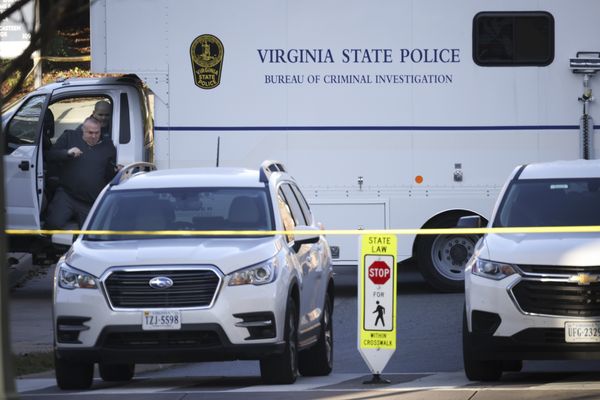It may sound a little strange that global markets are going through a meltdown due to fears of a potential recession in the next year or two, particularly given how strongly the economy has been performing.
Last week, the ASX 200 fell by 6.6 per cent — its worst fall since the COVID-19 crash of March 2020.
The Australian share market is undergoing a correction, having dropped by almost 16 per cent from its record high in August last year.
To be classed as a "bear" market, it will need to drop at least a further 4 per cent.
Meanwhile, on Wall Street, the S&P 500 and Nasdaq are deep in bear-market territory, having plummeted by more than 20 and 30 per cent, respectively, from their all-time highs.
In recent months, the Reserve Bank, US Federal Reserve and their global counterparts have lifted interest rates aggressively to bring down the cost of living, which has surged by its fastest pace in many decades.
They have also removed trillions of dollars in stimulus they had pumped into their COVID-ravaged economies over the past couple of years — a move that has caused their economies to overheat and for bubbles to emerge in the stock, property and cryptocurrency markets.
"This is a real downturn that is happening for real reason," nabTrade's head of investment behaviour, Gemma Dale, told ABC News.
"It's not just sentiment. Higher rates mean that you should pay less for equities (shares).
"Any company with a lot of debt is going to perform badly and a higher interest-rate environment," Ms Dale said, referring specifically to unprofitable tech and buy now, pay later companies.
On the flip side, she is more optimistic about infrastructure and toll-road stocks.
"Any company that can pass on their increased costs directly to the consumer, without any meaningful fall in volume... are really good companies to look at."
'Too early' to say markets have bottomed
The share market is undergoing an increasingly volatile period as there is considerable debate about how rapidly, and by how much, the RBA and its global peers will lift interest rates.
However, it is tough for central banks to reach a "neutral rate". It is a sweet spot where they are not stimulating the economy, nor are they causing it to slow down.
The US Fed, in particular, does not have a great track record when it comes to avoiding economic downturns during their previous rate hiking cycles.
The Fed has "never been able to correct" even smaller overshoots of inflation and employment "without pushing the economy into a significant recession", according to Deutsche Bank, which is forecasting a major recession for the US.
"We remain of the view that a global recession can be avoided," AMP Capital chief economist Shane Oliver said.
"Either way, it’s still too early to say that shares have bottomed."
Beware the 'dead-cat bounce'
Despite the market falling deeper into a "correction" or "bear-market" phase, some market experts are warning against "buying the dip".
During those tough phases in the market, there is often a short-lived recovery, followed by an even bigger sell-off. It is often referred to as a "dead-cat bounce" and likened to catching a falling knife.
"I think, for a lot of investors, piling in right now has a fair bit of risk attached to it," Ms Dale said.
"And you would want to have a very long time frame if you were looking at markets at this point in time."
"It's not unusual for people to feel that the worst has happened, and there's no more bad news in the market. They think, 'It's time to buy,' so we see a little bounce.
"Then the next day, everyone thinks, This is serious,' and, 'Oh God, I'm getting out.' And it's not always the same people."
Rate-hiking clues
This week, local investors will be paying close attention to the words of RBA governor Philip Lowe to see whether he offers any clues on the size of the next rate hike (July 5).
After all, he will give a speech on Tuesday morning titled, Economic Outlook and Monetary Policy.
Depending on what he says, it might cause investors to re-assess their bets on how high rates will climb (and by extension, how overvalued their shares will become).
On that same morning, the RBA will also publish the minutes of its June meeting, which may shed further light on why it opted for a bigger-than-expected rate hike of 0.5 percentage points.
Then on Friday, he will speak at an event in Switzerland, hosted by investment bank UBS, on the topic of central banks and inflation.
However, global investors will be more interested in what US Federal Reserve chairman Jerome Powell will say about interest rates this week.
Mr Powell is due on Wednesday and Thursday (local time) to give his semi-annual testimony about the state of America's economy to the US Senate's Banking Committee.
Dr Oliver expects the Fed chair to "be hawkish, reiterating the Fed's commitment to continue tightening until there is clear and convincing" evidence that inflation is falling.
"This is unlikely to reduce market expectations for a rise in the Fed funds rate to 3.5 per cent by year end and to well above 4 per cent by mid next year," he said.
Markets' rate predictions 'too hawkish'
The Reserve Bank lifted the cash rate to 0.85 per cent earlier this month after announcing a double-sized increase of 0.5 percentage points.
The RBA governor also gave a rare interview on 7.30 last week, in which he predicted Australia's inflation rate would hit 7 per cent by the end of this year, and reiterated his desire to see the cash rate lift to 2.5 per cent.
Dr Oliver said the market was expecting Australia's cash rate to rise to "nearly 4 per cent by year end, and above 4 per cent next year".
He said, in his view, that was "too hawkish" and unlikely to happen.
"A rise to 4 per cent for the cash rate would see average discounted variable mortgage rates rise to around 7.5 per cent (from around 3.5 per cent in April)," he wrote in a note to clients.
"When combined with the surge in fixed mortgage rates (which have already gone from around 2 per cent to around 5 per cent) it would likely cause real problems for consumer spending, [and] a big spike in mortgage stress (as debt interest payments will more than double from earlier this year).
He also said it would "push property prices down by 20 to 30 per cent … which indicates it's unlikely to happen as it would crash the economy and ultimately push inflation back well below the RBA's target [2-3 per cent]".







